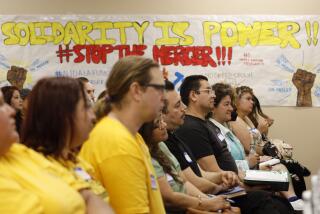Talks With Polish Regime Give Solidarity a Lift : Outlawed Trade Union Has New-Found Legitimacy, but Problems Remain
- Share via
WARSAW — The Solidarity spokesmen are on television every night, giving their version of events. They are interviewed in exhaustive detail, and they provide measured analyses of the situation.
The state-run television does not call them Solidarity spokesmen, for the movement is still illegal, or at least unofficial. But the spokesmen generally hold sheaves of paper or file folders with the union’s name clearly in sight.
The matter under examination is the recently opened dialogue, the so-called round-table discussions, between the outlawed independent trade union and Poland’s Communist government. For three weeks now, in almost daily sessions, negotiators for the two sides have been meeting in an effort to work out a plan for Poland’s future.
The plan’s details are indistinct, and concrete accomplishment remains distant, but the talks have brought about changes that could be difficult to reverse.
The regular, commonplace appearance of Solidarity officials on television--impossible four or five weeks ago--is an example. Journalists from Poland’s “unofficial” press, once accurately described as “underground,” show up for briefings of government spokesman Jerzy Urban and are designated “representatives of Lech Walesa’s press center.” Solidarity negotiators at the table are referred to by the government as “Lech Walesa’s organizational bureau.”
In the process, Walesa and the union movement he heads have been legitimized by the authorities--even if official sanction of the movement has yet to be announced. It is a calculated gamble on the part of the authorities, who hope that Solidarity can be made to share the blame for the country’s current mess while being deprived of the power to significantly change it.
Snags Encountered
The round-table talks have run into snags in recent days as groups discussing such issues as youth and the mass media have found themselves in sharp disagreement. Working groups discussing the economy and politics have also run into obstacles, with the two sides speaking what sometimes seem like different languages and pressing toward different goals.
Walesa met Thursday with Gen. Czeslaw Kiszczak, minister of the interior and head of the government delegation at the round-table talks, in an apparent effort to smooth out the differences. Neither side made public any details of the meeting.
While the talks have gone on, Solidarity activists in factories all over Poland have been getting organized and, in some cases, reclaiming offices that were occupied by the state-sanctioned unions after Solidarity was outlawed in 1981.
There is a feeling that time is on Solidarity’s side, while the government, by contrast, is in a race with the calendar and growing public and labor discontent.
“The pressure now is on the government,” a Solidarity activist said. “They want to get something done in the next two weeks because they are afraid of strikes. They are also afraid of the students, who are getting more daring and more impatient. They want to get elections held as early in the summer as possible.
“On our side, we are interested in agreement, but we know from experience that we have to press for every inch. The authorities do not surrender anything easily. We have to fight for it. And while the arguing goes on, we get our organization in shape and we see the sweat on their foreheads.”
Since the talks started, Walesa has been touring the country, talking to youth groups and factory workers. Somewhat ostentatiously, he has been preaching patience to all audiences, urging activist students to restrain their demonstrations and workers to resist striking for higher wages.
Most Are Quickly Settled
Small, sporadic strikes have become an almost daily feature of life in Poland in the last six months, most of them quickly settled by grants of more money for the workers. And although the threat of large-scale strikes in major factories has put pressure on the government, an actual outbreak of strikes could shake the Solidarity leadership as well, possibly eroding Walesa’s moderating influence.
A student demonstration last weekend in Krakow, in which the students ridiculed the Soviet Union and wound up in a violent clash with the police, brought expressions of concern from both Solidarity and the government.
Walesa, calling for calm, told the students that Poland could be built “only through work--wise, well-organized work.”
At a meeting in Lodz, Walesa asked: “Is there any other solution besides the round-table? What will happen if the agreement doesn’t work out? For me, this is the question: Shall we go the peaceful way, or shall we break heads with stones, as the young ones want?”
More to Read
Sign up for Essential California
The most important California stories and recommendations in your inbox every morning.
You may occasionally receive promotional content from the Los Angeles Times.













